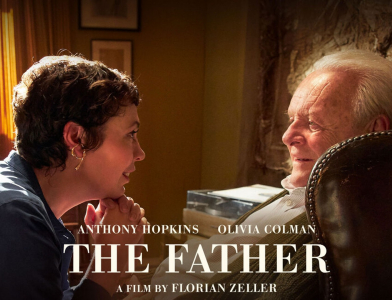A Critical Review of the film ‘The Father”

“I feel as if I am losing all my leaves. The branches, and the wind and the rain…I have nowhere to put down my head anymore… I don’t know what’s happening anymore… But I know my watch is on my wrist, that I do know. Do you know what’s happening?”
The above quote occurs during one of the final scenes from the film “The Father”. In this adaption of a 2012 prize winning play, the director and writer, Florian Zeller places the audience within the mind of Antony (played by Anthony Hopkins) who is living with dementia, whilst offering the perspective of caregivers/caretakers and loved ones navigating the experience. From start to finish, you never really understand what is true – as characters come and go and take on various names and identities, depending on the father, Antony’s, recognition of them. This unique perspective offers some insight into the disruption of memory and thoughts for some who live with dementia. During the film, everything is in flux, until the very end leaving you in a state of confusion and distrust of your interpretation of the story told. Much like the main character’s current state of mind.
The themes of illness, home, and family— are prominent yet ephemeral. Told almost entirely from a first-person perspective, the film brings to life the patriarch’s life with dementia surrounded by people and imagery acting as background noise. We suspect that this story may hit close to home for viewers who’ve experienced such a decline with members of their own family, but perhaps it will provide some solace, as well. In that the public becomes more aware of the challenges of living with and experiencing dementia. With this being said, what is interesting to note, is the lack of acknowledgment of any formal diagnosis. While there is portrayal of typical symptoms of dementia or tongue-in-cheek jokes of memory loss, there is no mention of the word dementia throughout the film.
The fear here is, that the narrative is understood as the natural process of senescence. Which is both a non-typical reality of the aging process and quite frankly – false. Aging isn’t a disease. It isn’t something that is to be cured. Understanding that approximately only 8% (although slowly increasing) of those 65+ live with a dementia (characterized as a disease), is not a typical part of the aging process. While we notice a change in grey matter density and shifts in our cognitive process, which can mostly be accounted by adjusting latency, cognitive decline is not a natural part of the aging process.
Older people’s stories remain largely unseen and underrepresented in Hollywood. They rarely live at the centre of the story and if they do, the narrative often surrounds decline/ illness/ death. This film largely reminded us of Amour, in that it takes an insightful, subtle, and nuanced look at dementia and the toll it can take on the person and those in close proximity. However, depicting older people– as in need of care, with a lack of personhood, and acknowledgment of life experienced can be problematic. This is nothing new for Hollywood, and although not the aim of the film, it is something to be critical of when watching.
The portrayal of family and gender dynamics also played a key role. Olivia Colman’s character, Anne, highlights the impact of a caregiver bestowed upon women as they get older. The struggle, the back and forth between their own life and the life of those whom they care for, are all realistic feats that caretakers, and particularly, women must contend with. At a particular point in the film, an argument occurs between Anne and her partner as a result of his ongoing impatience for her to ‘get on with it’, which perfectly showcases the discrepancy in gender expectations. As well, the fear portrayed by Antony in his occasional flinch’s when interacting with a particular character, depicted an unsettling reality of many people living with dementia. It speaks to the number of seniors experiencing both emotional and physical abuse within familial and non-familial contexts, something that we, as a society and gerontologists need to work harder at addressing.
Overall, this was a very interesting film. With great performances and a commitment to the narrative that might be too much for some, “The Father” is nevertheless the work of someone who isn’t afraid to ask the big questions about human nature and the progression of an illness. The aim of the film was not to disrupt the narrative of third or fourth age, but to provide insight into the challenges experienced by those living with dementia and the implications on the family. Critically, while it may be a reality for some, it isn’t a reality for all. We are not suggesting depicting dementia or aging in a positive light, but as one that is real, with substance, that doesn’t require a dramatized film score. And we have yet to see many of these films, that allow older people to be at the centre of a story without an ailment as their focal point. Stories of life lived and living, experienced and experiencing, endured and enduring – that are not necessarily intertwined with what senescence could look like for some. Something we hope to get to see in the future.
Finally, we would like to thank the Gilbrea Centre and Elevation pictures for inviting us to the advanced screening of the film, and allowing us the opportunity to provide insights as researchers in the field. We would like to note that we are not film critics, albeit dilettantes of the arts, and have no formal insights but our education and training as budding gerontologists. The comments here are not intended to act as a review but merely as an observation and our opinions of the narrative of later life portrayed in the film/play.
Blog PostsRelated News
News Listing

June 24, 2024



